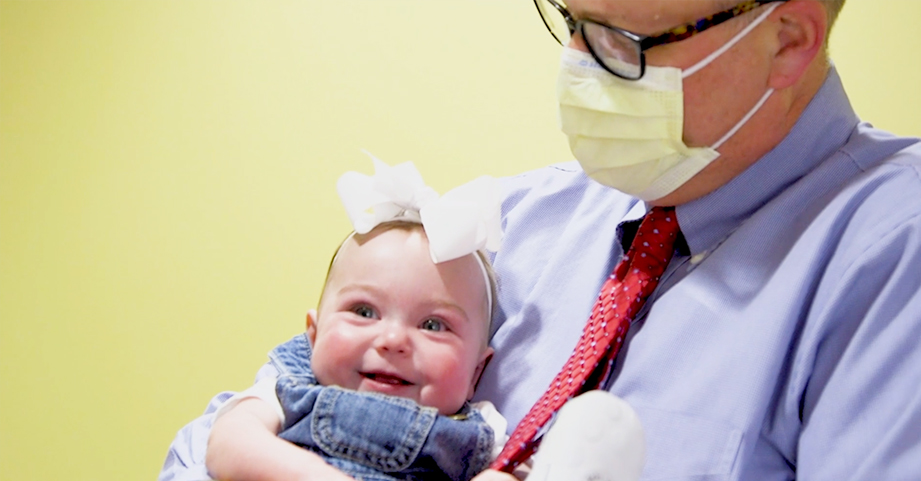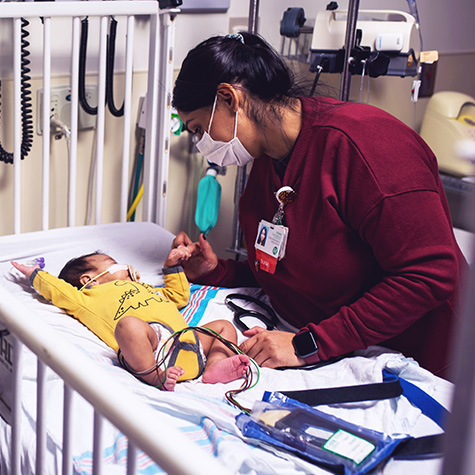Miller Is Thriving Today Thanks to Collaborative, Comprehensive Heart Care
At their 20-week ultrasound, Miller’s parents learned that their daughter was diagnosed with a rare, complex heart defect. Today, Miller is thriving thanks to the comprehensive, collaborative care that she received through the Children’s Heart Center’s fetal cardiology program.

At their 20-week ultrasound appointment, expectant parents Cameron and Nick Prostko were eager to see the shape of their baby’s face, the wiggling of little hands and feet, and maybe even learn whether they were having a girl or a boy. What they didn’t expect to discover was that their baby had a congenital heart defect.
“When you get pregnant, you’re just thinking ‘I don’t want this to happen or this to happen,’ and a heart defect was never really anything we thought about,” says Cameron.
The specific diagnosis was Ebstein’s Anomaly, a rare condition in which the tricuspid valve–the valve between the upper right and lower right chambers of the heart–is undeveloped. The prognosis, the Prostkos soon learned, was uncertain.
The couple met with Rick Michelfelder, MD, director of the Fetal Cardiology Program at the Children’s Heart Center to determine next steps, and he was candid about the challenges ahead. It was clear their baby would need surgery, he says, but what kind and how complex he just didn’t know; there was no guarantee she would survive.
“Miller had a very severe complication of Ebstein’s Anamoly called a ‘circular shunt,’ which consists of severe tricuspid valve regurgitation as well as severe pulmonary valve regurgitation. This combination can result in significant ‘stealing’ of blood flow from the brain and body,” explains Dr. Michelfelder. “Untreated, survival beyond the newborn period is very low and, in fact, many babies with these findings won’t survive to birth.”
“If I was a parent who had just been told that my unborn baby had a heart defect, I would want to know the truth; I would want to know in accurate, honest terms what the scope of the problem was,” adds Dr. Michelfelder. “But I would also want to know that there was hope and that there was a network of care providers and a skilled team of specialists available to help me get through this.”
For the Prostkos, that team included a perinatologist, who specializes in high-risk pregnancies, and an OBGYN who worked with the Children’s fetal cardiology team to coordinate a specific care plan for the duration of Cameron’s pregnancy.
“Given the severity of the baby’s condition, our Fetal Cardiology team, in consultation with Cameron’s maternal-fetal medicine team, recommended a trial of indomethacin therapy, a medicine used to diminish the circular shunt and improve outcomes in this high-risk population,” says Dr. Michelfelder. “The therapy was successful, however the side effects of the medication required Cameron to stop the indomethacin at 31 weeks gestation, four weeks after therapy began. Fortunately, Miller’s condition remained stable.”
When Miller Prostko was delivered on Dec. 7, 2020, a transport team was ready and waiting to take her to Egleston Hospital. Two days later, Paul Chai, MD, chief of Cardiothoracic Surgery and co-chief of the Children’s Heart Center, performed Miller’s first heart surgery.
“We all worked collaboratively prior to delivery to make sure that we have everyone around the baby that needs to be there to take care of their specific condition,” says Dr. Michelfelder.
Miller spent her first 23 days at Children’s. At five months, she returned for a follow-up heart procedure, and she’ll need an additional surgery at age three or four. “Our team worked so seamlessly,” says Dr. Michelfelder. “From Miller’s delivery plan to the first 36 hours of her life in our Cardiac Intensive Care Unit and the surgical team’s integration into the decision making…I think it could not have gone better as far as teamwork and communication.”
Today, Miller’s heart is strong and she is thriving. For that, her parents credit the Children’s Heart Center team.
“Kids are in the best hands at Children’s. I think that gave me reassurance and hope that everything was going to be alright,” says Nick. “I would tell other parents that I know it might be hard at first just to trust what the doctors are telling you, but they will do what’s best for your baby. They’ve helped my daughter live.”
Caring for the Tiniest Hearts
-
Children's Fetal Cardiology Program
The Fetal Cardiology Program at the Children’s Heart Center delivers care to expectant mothers whose unborn children have suspected or known heart defects.

As the largest cardiac program in the Southeast and one of the five largest pediatric heart centers in the nation, the Children's Healthcare of Atlanta Heart Center provides exceptional treatment to infants, children and teenagers who have complex heart defects.
Learn moreContact Us 404-256-2593